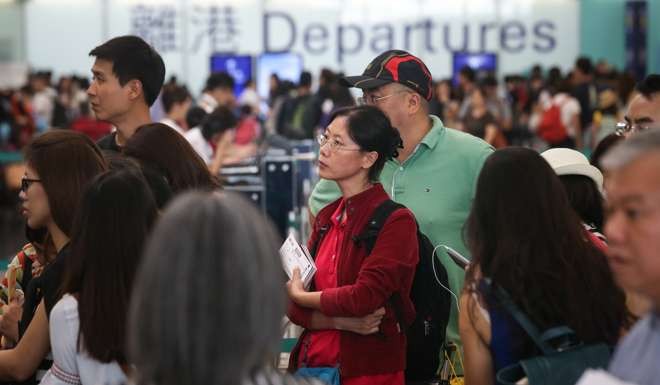
Increased flights between UK and China may pile pressure on Hong Kong airlines
Fewer passengers will need to travel via Hong Kong after a deal this week raised the weekly cap on China-UK flights, say analysts
A new deal which could see direct flights between Britain and the Chinese mainland more than double may heap further pressure on Hong Kong’s airlines, according to market watchers.
The two governments agreed on Tuesday to raise their current weekly cap on the number of passenger flights between the two countries from 80 to 200. The deal comes as Britain seeks to boost international tourism and trade links ahead of formal Brexit negotiations which are set to begin in March.
“It is highly possible there will be fewer Chinese mainland and UK passengers taking a connecting flight in Hong Kong when more than double the number of direct airline services are offered,” said Ivan Li Sing-yeung, the head of research at Sinopac Securities. “The expected reduction in passengers will have a negative impact on Hong Kong’s flagship carrier Cathay Pacific Airways, but not that seriously I suppose.”
Chinese major carriers can expect to be the biggest winners of the deal
Zhang Jing, an analyst from Phillip Capital, echoed Li’s views. She said: “Some negative effect will come to Hong Kong carriers with the new deal taking off.
“With more direct flights between the UK and China being provided, it is unnecessary for some passengers to transfer in Hong Kong.”
Cathay Pacific announced on Wednesday evening that it has lowered its second-half profit forecast in the wake of increased overcapacity and competition since an interim report in August. The announcement made no mention of the new Sino-British deal.

Li said there is no doubt that mainland Chinese and UK airlines will be the direct beneficiaries of the new arrangement.
“Chinese major carriers can expect to be the biggest winners of the deal because they have the ability and capacity to offer new flights to and from the UK,” said Li who warned that airport capacity will become a constraint if the China-UK routes are significantly expanded.
Toliver Ma, an aviation analyst at Guotai Junan International, expects the three biggest Chinese airlines – Air China, China Southern Airlines and China Eastern Airlines – to benefit most from the new deal. However, the three airlines have not yet officially announced any new flights, despite long-haul routes being the most profitable for global airlines.
The deal will not automatically translate to extra profit rise for Chinese carriers, analysts warned, though it may well lift the number of Chinese air passengers, because they are sensitive to the currency exchange rate.
The pound at historically weak levels will attract Chinese customers [to the UK] for shopping
“The pound at historically weak levels will attract Chinese customers [to the UK] for shopping,” Ma said. “But the rise in travellers cannot guarantee profit improvement for carriers because the weaker Chinese yuan will enlarge their exchange loss.”
For the first six months of 2016, Air China recorded a net exchange loss of 1.698 billion yuan, 1.575 billion yuan greater than the loss reported in the same period of 2015, mainly due to the faster appreciation of the US dollar against the yuan. The Chinese currency has fallen 3.57 per cent in the first 10 months this year.
“The trend of the weakening yuan cannot be halted in the short term, with rising expectation of a US rate hike,” said Ma.
“The net exchange loss is still putting big pressure on Chinese airlines, but I think the risks from a weaken yuan will ease gradually as Chinese carriers improve their debt structure.”
Fierce competition among airlines will keep ticket prices low, he added. “The revenue cannot increase with cheaper prices even if there’s more passengers. The concerns over terrorist attacks in Europe will also suppress their willingness to expand the routes to that region.”
For the UK, the final decision on whether to introduce additional flights is a commercial one for individual carriers, said Transport Secretary Chris Grayling, who claimed the deal is “a big moment for the UK”.
Grayling said on Tuesday: “Strong connections with emerging markets like China are vital for us if we are to continue competing on the global economic stage.”
The UK Aviation Minister Tariq Ahmad added: “These new arrangements will further strengthen British-Sino relations. Post Brexit, improving trade links with key markets such as China will boost exports and tourism.”
Earlier this year Manchester Airport launched the first direct route between Britain and China from an airport outside London, bringing an estimated £250 million in economic benefits to Britain over the next decade.
Visits to Britain from China are on the increase, up 46 per cent in 2015 to almost 270,000. Spending increased by 18 per cent to £586 million during the same period, moving China into the UK’s top 10 most valuable inbound markets, according to official UK government data.
.

